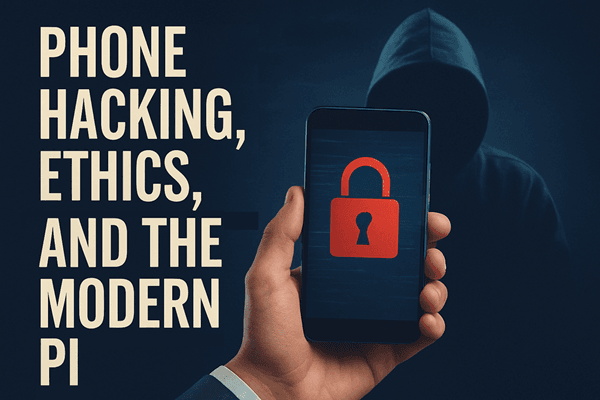If you’ve tuned in to ITV’s new drama The Hack, you’ll know it’s not just another crime thriller. The series, starring David Tennant and Robert Carlyle, dives into the real-life phone-hacking scandal that rocked Britain’s media industry. It’s a story of power, ambition and the blurred lines between investigation and intrusion. Juicy drama!
For those outside the world of journalism or private investigation, it can make for uncomfortable viewing. The show reminds us how easily curiosity can fall into the realms of misconduct, and how important trust and ethics are, especially when information becomes currency.
But beyond the TV drama, The Hack raises serious questions that still matter today – even moreso if you’re considering hiring a private investigator.
When Investigation Crosses the Line
The heart of The Hack is about methods. It shows how journalists and private investigators were drawn into gathering private information by any means necessary – phone tapping, data blagging, and surveillance without consent.
It’s a reminder of what happens when the drive to “find the truth” ignores the boundaries set by law and decency.
Modern private investigators work under very different standards. While there are no regulations on private investigators, there are standards to abide by. In the UK, data protection law (GDPR), the Regulation of Investigatory Powers Act (RIPA), and human rights legislation set clear limits on what can be accessed, tracked or recorded.
Professional investigators who operate legally and ethically know that evidence gathered unlawfully isn’t just wrong – it’s unusable.
When you hire a reputable investigator, you’re not paying for corner-cutting. You’re paying for expertise, discretion, and compliance – the kind that protects both you and your case.
The Power of Information – and the Responsibility That Comes With It
What The Hack captures well is how powerful information can be. Whether in a newsroom, a courtroom or a family dispute, information can change the whole outcome.
For private investigators, it’s equally important to show restraint. Gathering intelligence – whether through surveillance, open-source research, or witness tracing – must always be lawful, proportionate and necessary.
It’s a message that’s worth underlining in an age where so much personal data sits online. A professional investigator doesn’t exploit loopholes or spy software; they use legitimate investigative techniques and robust due diligence to uncover the truth without breaching anyone’s rights.
Lessons from the Daniel Morgan Case
One of The Hack’s key story threads is that of Daniel Morgan – a real-life private investigator murdered in 1987, whose death exposed deep corruption within policing and parts of the investigation industry.
It’s a sobering chapter in the history of British private investigation, and the show doesn’t shy away from its complexity. For today’s investigators, it’s a reminder of how essential integrity, transparency and accountability are to the profession’s reputation.
The sector has evolved enormously since those days. Modern investigators undergo vetting, adhere to data-protection principles, and often hold membership of recognised professional bodies – giving clients reassurance that their work is both ethical and defensible.
Why Ethics Matter to Clients
From cases involving a married couple, to corporate due diligence, clients hire private investigators because they need clarity – not controversy.
The best investigators will always begin by setting expectations: what’s legally possible, what’s reasonably, and how evidence will be gathered. That clarity is what separates professional investigation from tabloid-style snooping.
If The Hack teaches us anything, it’s that how you uncover the truth matters as much as the truth itself.
The Modern Investigator’s Role
Today, professional investigators are more likely to use open-source intelligence tools, social-media analysis and digital forensics than phone tapping or physical stakeouts. Their focus is on precision and professionalism, not sensationalism.
While the headlines of the past cast a long shadow, modern investigators have worked hard to rebuild trust – operating quietly, lawfully and with a duty of care to their clients and the people they investigate.
Final Thoughts
The Hack might make for gripping television, but it also holds up a mirror to how far the investigative world has come. The scandals it portrays prompted the industry – and the public – to demand higher standards of privacy, transparency and professionalism.
If you’re considering hiring a private investigator today, the takeaway is simple: choose one who values integrity as highly as results. In the end, ethics aren’t just good practice – they’re good protection.
Call us on 01772 334700 if you want to know more.

